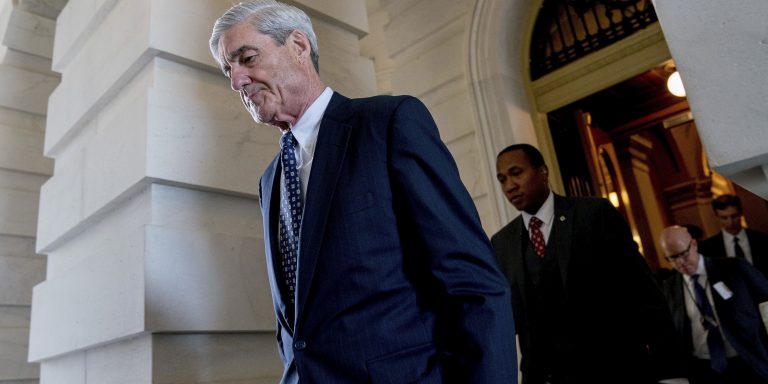INTELBRIEF
October 31, 2017
TSC IntelBrief: A Plea and Indictments

• On October 30, charges were announced against three former Trump campaign officials, stemming from Special Counsel Robert Mueller’s investigation of Russian interference in the 2016 U.S. presidential election.
• Former campaign manager Paul Manafort and his associate Rick Gates were indicted on 12 counts; including money laundering, failing to register as foreign agents and conspiracy against the U.S.
• Former campaign foreign policy advisor George Papadopoulos also pled guilty to lying to the FBI over what appears to be evidence of possible collusion between members of the Trump campaign and the Russian government.
• Despite President Trump’s tweets and statements denouncing the Mueller probe, these indictments and the ongoing investigation are of national importance.
On October 30, 2017, the investigation headed by Special Counsel Robert Mueller unveiled a 12-count federal indictment against President Donald Trump’s former campaign manager Paul Manafort and his deputy Rick Gates. Investigators also unsealed a plea agreement between the Special Counsel and former Trump campaign foreign policy advisor George Papadopoulos. The charges stem from the Mueller investigation into Russian interference in the 2016 U.S. presidential campaign, and possible collusion between Moscow and the Trump campaign.
Both Manafort and Gates pled not guilty to all charges in federal court in Washington D.C., shortly after the indictment was released. Both face counts including conspiracy, failing to register as foreign agents and money laundering (allegedly for trying to hide millions of dollars they made in a very opaque fashion in Ukraine.) While those charges are not directly related to the campaign, the Manafort indictment in particular may be crucial to the investigation, given his nearly five-month stint as Trump’s campaign manager and his well-known (albeit unregistered) lobbying efforts for pro-Russian, Ukrainian officials.
In normal political times, this would be a massive scandal by itself.
Yet it is the Papadopoulos plea agreement that seems the most damaging right now to the Trump presidency; given the national security implications of prominent campaign officials working with Russia to influence an election. Papadopoulos’ plea deal includes statements that both he and senior campaign officials were told explicitly in April 2016, that Russia had ‘dirt’ on eventual Democratic Party nominee Hillary Clinton, and that they sought to meet Russian officials to discuss what they had. The document also states that Papadopoulos was in regular contact with a Russian middleman and an officer in Russia’s ministry of foreign affairs (almost certainly an intelligence officer) about ‘thousands of emails’ that Russia had on Hillary Clinton.
These contacts and conversations took place months before the emails hack at the Democratic National Committee (DNC) was made public in June 2016. When then-candidate Trump remarked at a press conference that no one knew if Russia had the emails, adding he hoped they had and would release them, the possibility exists he may already have learned about the hack and plans to make the emails public. Members of his staff appear to have known; according to Papadopoulos' plea, he was told about the emails in April.
Papadopoulos is now cooperating with the Mueller investigation. In court documents, he’s described as a ‘proactive’ witness; a term that covers, among other possibilities, witnesses who wear a wire when speaking with other potential investigation targets. Papadopoulos was arrested in June, and pled guilty in early October, without any of that being leaked or otherwise made public. While Papadopoulos has been characterized as a minor anonymous campaign staffer, that has been contradicted by President Trump, who in March 2016, put Papadopoulos third on a list of his foreign policy team. Papadopoulos also attended a highly-publicized meeting of the Trump National Security Team in March 2016.
Evidence that Trump campaign officials knew that Russia had thousands of Hillary Clinton emails months before the information was made public — and then lied about doing so — is extremely concerning as it relates both to the behaviors and intentions of those officials and the scope of Russian involvement in the U.S. presidential election. Meanwhile, Special Counsel Mueller’s investigation is nowhere near finished and more indictments are expected. Mueller appears to be ‘working by the book’ — introducing characters and building a broader narrative based on evidence revealed in legal pleas and indictments. It is obvious that investigators know a great deal more than has been made public, in what is clearly a very complicated, professional probe where sensitive information is being closely held until the time is ripe for its release. It is equally obvious that the notion of collusion between Trump campaign officials and staffers and the Russian government is not ‘fake news.’ Based on the latest legal proceedings, it may be an unprecedented scandal of national security importance.
.
For tailored research and analysis, please contact: info@thesoufancenter.org
.
.